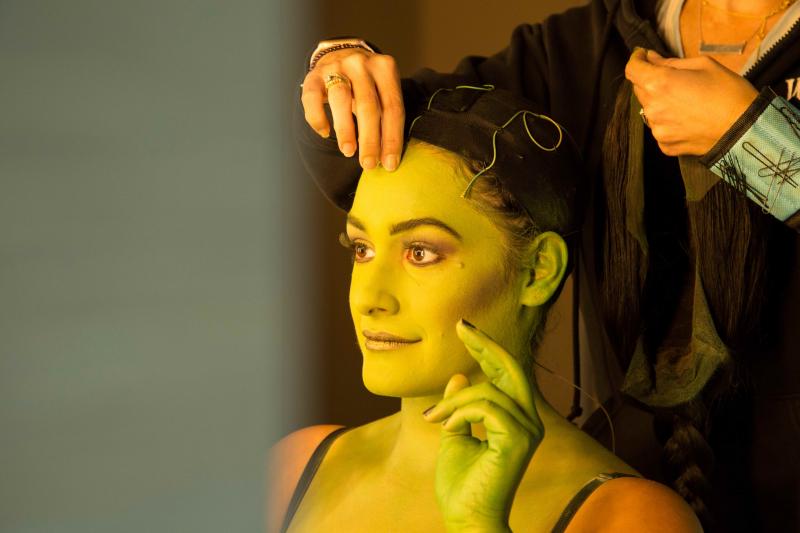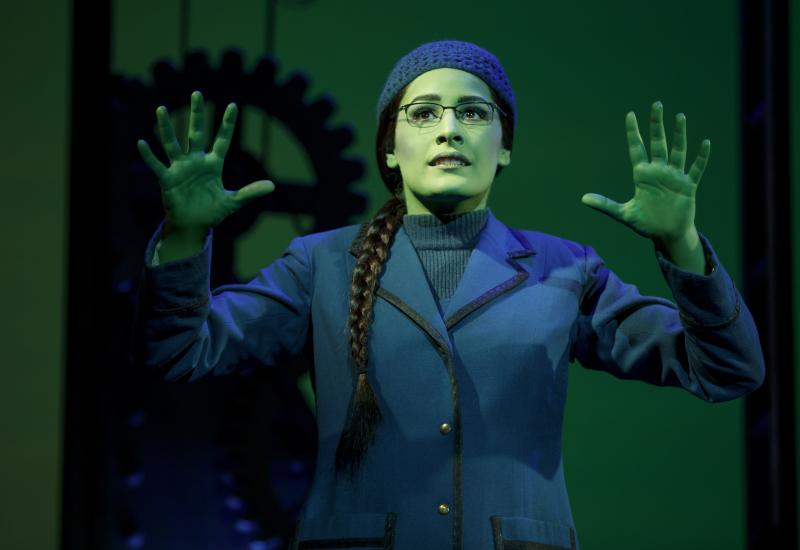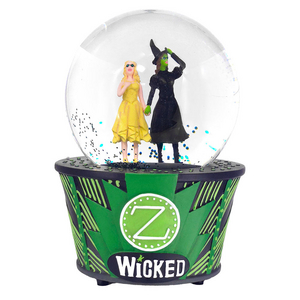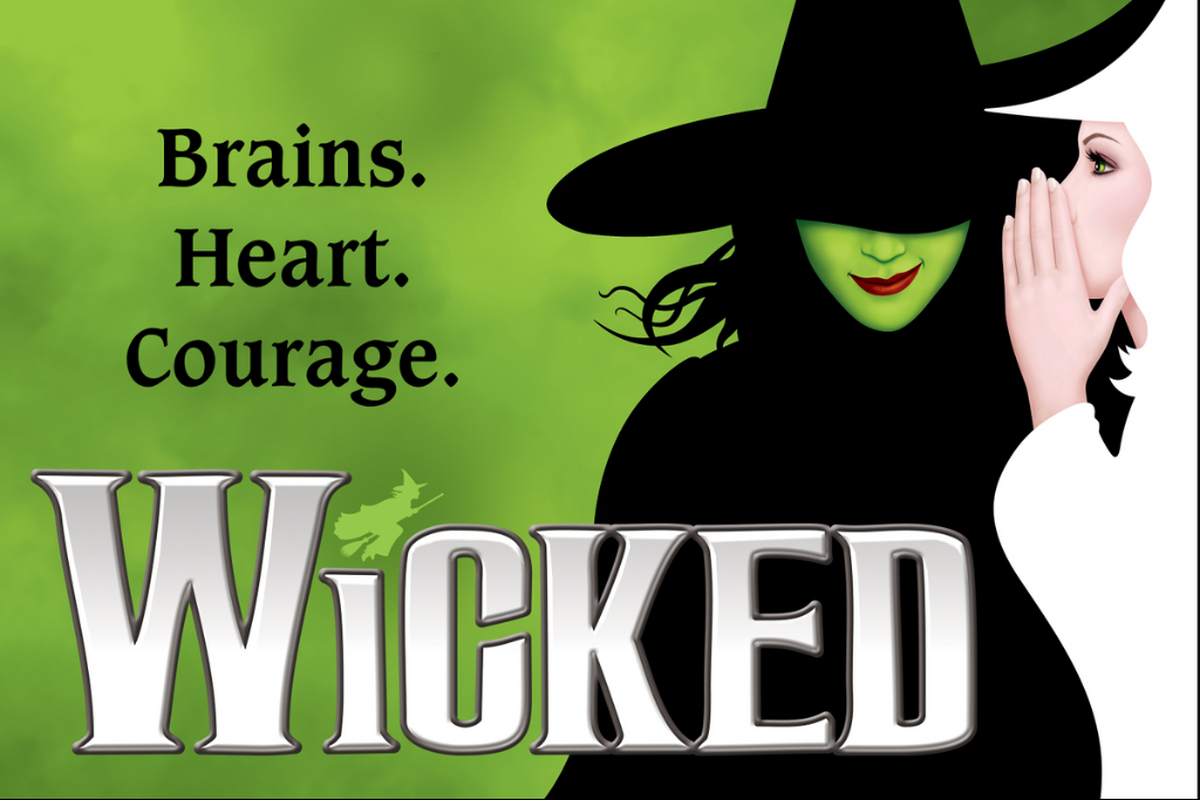Guest Blog: What It's Like Being The Elphaba Standby In WICKED
All I ever wanted was to be an Elphaba Standby. Not the principal Elphaba - specifically, the standby. It took me 15 years of dreaming and six years of actively auditioning for me to earn my dream job. During those six years of Wicked auditions I locked into the idea of being the standby because, the way I saw it, the job would be like being paid to learn. I love learning; I love being a student, maybe more than anything else. I love highlighters and raising my hand and making discoveries (sound like a certain green girl we all know?); but I could never afford to take acting classes. I always imagined that being an Elphaba Standby would allow me the opportunity to learn not just the show, but how musicals work - from how actors sustain themselves for eight shows a week, to how the sound engineers mix a show, to how a makeup supervisor... well, supervises. And I was right, by the way. That is the exact perk of being a standby - you get to see everything.
I think what most people would consider to be the downside of being a standby is the fact that we don't perform often. I never for a second anticipated that that would be an issue for me; because from an ego standpoint, I don't at all mind not being the one on stage every night. Watching other people perform fascinates me. Our principals are incredible, and I relish watching the show from the wings and soaking up every little thing I can learn from every performance. I have now stood by for three powerful, talented, warrior women; and sometimes I feel guilty that I'm not paying them for all that they've taught me. So from that perspective, not being the person on stage all the time is a gift! What I didn't take into account, however, is how hard it is to feel capable of doing a good job when you perform infrequently. That was a big surprise to me - that I in fact did become anxious and stressed when, in my biggest performance gap to date, two months went by without me touching the stage. Elphaba is a beast of a role, and what the job of a standby does not have built into it is the possibility to truly build stamina.

So the past ten months have been the most incredible, life affirming, beautiful, hardest, most stressful, and scariest nine months of my life. It's been a journey that has fulfilled all of my expectations, but delivered some massive surprises, too.
But let's rewind.
When word got out that I had been cast in the National Tour of Wicked as the Elphaba Standby, the majority of the texts I received from friends read something like, "Congratulations! This is so exciting! ...So, what's a standby?" It's an understandable question: Most people have heard of an understudy, but the standby position is more elusive.
The biggest difference between an understudy and a standby is that an understudy is always performing on stage, whereas the standby ONLY goes on stage if they are performing the principal track that they cover.
Wicked has both an Elphaba Standby and an Elphaba Understudy. As the Elphaba Standby I am first in line to take over the role if our principal is out; but if I'm not on for Elphaba I am backstage during the show. Our understudy performs every night in the ensemble, and then if both the Principal and I are out of the show, she goes on as Elphaba (and a swing takes over her ensemble track).
Unlike a regular cast member, whose day is pretty straight forward, my workday varies not only from day to day based on what I need to keep myself show-ready; but also from city to city, based on what logistically is actually possible for me to do during the show.
While the show is going on, there are a host of different ways I can use the time to keep my stamina up (and to keep myself familiar with the lines, blocking, etc). Here are just a few of them:
1. I can spend the show in the Principal Elphaba's dressing room, singing along. The sound is piped into every dressing room backstage, and since Elphaba has virtually no breaks during the show, once our principal heads out on stage the room is pretty much free. I sing along with the show full-out to keep my vocal stamina up.
As a standby, it's my job to build my stamina on my own. It takes an incredible amount of stamina to play this role - physical stamina, mental stamina, vocal stamina... Take vocal stamina: The voice is a muscle, and so with singing the show every day that muscle gets stronger. But in my case, let's say I only go on one time in a month - technically, I only have to sing the show that one time. In order to build up the stamina it takes to succeed in this role, I need to, on my own time, sing through the show as much as I can.
2. If I'm really lucky, we'll hit a theater that has an on-site rehearsal room (which the sound gets piped into as well). I relish those cities, because then not only can I sing through the show in real-time; I can also physically move through the show. This is great for keeping my physical stamina up.
3. I can stand in the wings and watch the show. I'm a visual learner, so watching the onstage and offstage traffic fairly frequently helps me feel confident that I won't forget the blocking when it's time to go on.
4. I can watch the show from the back of the audience (this is my favorite thing to do!). It's such a special gift of this position, to get to watch the show as an audience member whenever I want. Every time I do this, I learn something new that influences my next performance. When I watch from the wings, my eyes are always on Elphaba - I'm watching all of her movements to help reinforce what I've learned. But when I watch from the audience I'm looking at the big picture.
5. I can do a physical therapy session, if I need it. This helps me stay physically healthy enough to be able to handle the physical demands of the show.
Overall, I try to stay engaged with the show in some way; this not only helps me stay prepared, but it also makes me feel like part of the team. Of course, there are some days where my brain just needs a break and I'll relax backstage and find a swing to play bananagrams with - and I'm grateful that my job affords me the opportunity to rest when I feel I need it.

Being a standby is hard work; and those surprises I mentioned earlier, the difficult parts of touring as a standby that I didn't quite anticipate? Well, there have been a lot of them along the way. But here's the thing: Hardship is subjective. Not everything that I've found to be difficult while inhabiting this job will be the same things that the next person to tackle this job will find difficult. So what I think is more valuable to share is what I believe to be objectively the greatest gift of being a standby: The opportunity to learn about, and from, all of the other departments that work backstage to make a show successful.
As a standby, when I am not performing I have the opportunity to experience Wicked from every single department's point of view. I've watched the show from the sound booth, from the lighting booth, and even from the pit! I've trailed my colleagues in props, wardrobe, and hair... It's been a great way to make friends, and has also opened me up to the many fascinating jobs people do here at Wicked, and how hard the people performing those jobs work.
When you're performing the show and you're in the thick of it all, focusing on giving the best show you can give, it can be easy to lose an awareness of what's happening around you. Had I never experienced the show from backstage, and seen how hard our crew works, I might never have noticed that while I'm on stage, dozens of people are buzzing around doing things to help me succeed. When I'm on stage now, my peripheral awareness is hyper tuned in to the people in the wings who are not only working their butts off to accomplish their specific tasks, but who are also watching my every move to make sure that I'm ok.
And so, to all of the future Elphaba Standbys, I say: Get ready to feel so, incredibly lucky that after a lifetime (if you're like me) of learning how to perform, you are now about to have the opportunity to learn about every other job that exists in the world of theater. And this will in turn make you a far better performer; because the more you realize how strong your team is, the more grounded you will feel on stage.
Because of the opportunity I've had to watch our crew navigate the backstage labyrinth of Wicked, I now have the privilege of knowing that while I am performing, our stage managers OB, Colleen, and Aaron are always making sure I am where I need to be; that my Hair Supervisor, Andrea, will always narrate my quick-change in case I forget a step; that our carpenders will always keep me safe; that our head of props, Bob, will always make sure I have what I need, both as Elphaba and as Cecelia; that when I sneak a peek at our conductor, Adam, his eyes will always be there to meet mine to signal to me that I'm not alone; that if I'm performing while under the weather and I'm extra nervous, our sound engineer David will have my back while he mixes the show, and our other sound engineer James will catch me in the wings in between scenes to literally wipe the sweat off my mic; that our carpenter Forrest will always remind me to breathe, and our carpenter Matt will always pick me up off of the floor at the end of the show and whisper "good job, sister" in my ear as he walks me off stage.
So what is it like to be an Elphaba Standby? It's probably the hardest job I will ever have; but it's also a constant exercise in awareness, appreciation, and gratitude - an amount of gratitude I didn't even know was possible - for getting to walk (and sometimes fly) down the most special, educational, and absolutely wild road I have ever walked down.


 Wicked Logo Pin
Wicked Logo Pin Wicked One Short Day Globe
Wicked One Short Day Globe Wicked Youth Distressed Clock Tee
Wicked Youth Distressed Clock Tee Wicked Women's For Good V-Neck Tee
Wicked Women's For Good V-Neck Tee
